“Inner-city Cleveland is not the ideal place for the birth of a naturalist, but it’s the place where my love for the outdoors began,” described Nicole Jackson, one of the co-organizers of Black Birders Week.
At first, nature served as a healing agent for Jackson. This therapeutic connection to the outdoors developed into a passion for teaching others how to find their own transformative connections to the natural world. “Everyone everywhere needs a dose of nature for mental, physical, or emotional health,” Jackson said. “My goal is to help empower those in under-served communities to find their voice to make their environment better, and to grow environmental stewards for the world.”
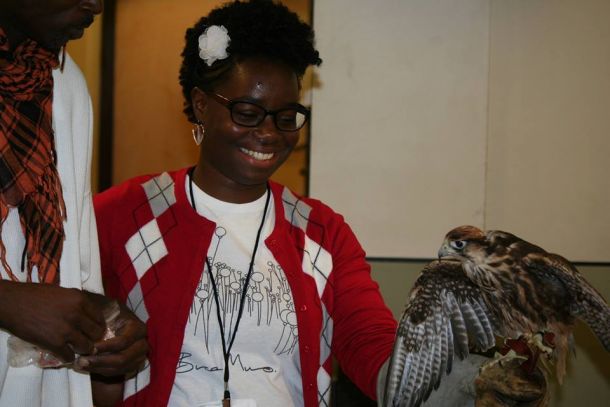
Nicole Jackson experiences the joy of holding a falcon alongside Black raptor expert Rodney Stotts.
Jackson’s environmental leadership journey began as an undergraduate at Ohio State University when she was awarded a position as a Toyota TogetherGreen Youth Fellow. This experience paved the way for Jackson as an environmental educator who now works with urban youth in Columbus, Ohio. During our interview, which has been edited and condensed, Jackson touched on the steps she took to become an urban naturalist, what Black Birders Week meant to her, and how she would like to see our country’s national parks and public lands become accessible to all.
Q: How did you get involved with Black AF in STEM?
Nicole Jackson (NJ): I found out about Black AF in STEM back in February 2019. I connected with Jason Ward after seeing his “Birds of North America” segment on YouTube. I had never actually met him in person. I had a conversation with him about visiting Toledo, Ohio. Every year in Toledo we have the Biggest Week in American Birding festival, and he had never been. I invited him to come to Ohio State University, which is where I work, through the School of Environment and Natural Resources. We were planning to set up a program for February, and I figured that it would be a good time for us to have Jason join us to talk about his work and why it was important to him, as well as the “Birds of North America” series and how that started. After the program, he added me to the Black AF in STEM group. Through the group I was able to connect with other Black people that were interested in STEM, nature, the outdoors and birding.
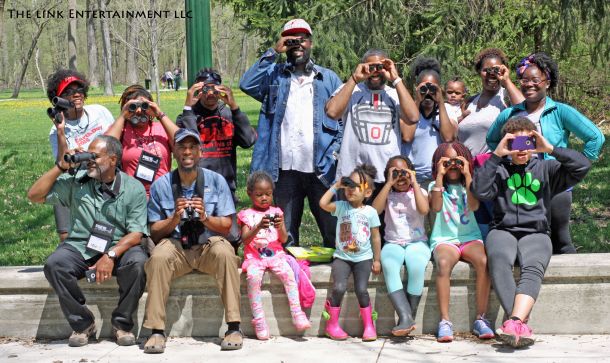
Nicole Jackson (far right) leading a group during the Biggest Week in American Birding festival in Toledo, Ohio.
Q: Were you always passionate about birding?
NJ: My main goal growing up was actually veterinary medicine. After my second year in college, I realized it wasn’t something I was as invested in as I thought I was. But I still wanted to continue my educational journey and look into different environmental careers. At the time, my advisor Amanda Rodewald, would go to places like South America and Spain and study birds and their behavior. She asked if I would be interested in doing fieldwork and she had an internship available working with her grad students in Columbus, Ohio studying Acadian Flycatchers and Northern Cardinals. I had no prior field research experience before that or even studying birds. That internship was my first taste of field research and what it meant. During that summer, we would go out every day to look at bird nests and look for mating pairs to see if they were banded or not. We also looked at the vegetation and wildlife that was around as they were building their nests and collected that data. Through the internship I made a connection with park visitors. Everyday people would come through the park, walking, hiking with their dogs, with family, and then they would see us collecting all this information and data and would always ask what we were doing. It was really fun to just talk to park visitors about what I was doing and that’s where it clicked in my head. I want to do more with this. Is there a way for me to teach people about nature? More on an outreach level in science, to get them more engaged with the natural world around them. I decided to major in Parks, Recreation and Tourism, and I earned my Bachelor of Science degree in Environmental Education, and have been focusing on that ever since.
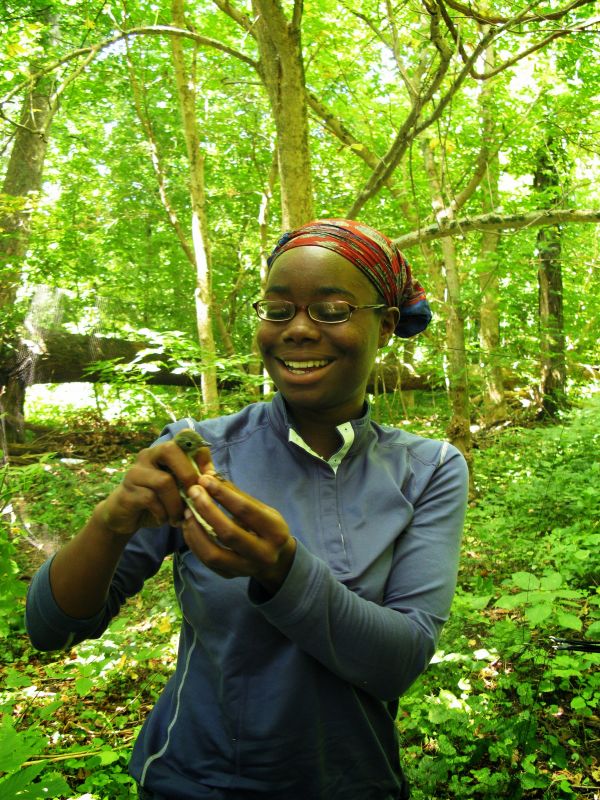
Nicole Jackson holding an Acadian Flycatcher during one of her first field research internships in Columbus, Ohio.
Q: Do you have a favorite bird?
NJ: I don’t think I have a favorite bird because there are so many, and every time I learn about a new one, I get even more excited. I do remember my spark bird being the Gray Catbird just because of its song. I remember we had to check a nest of a Gray Catbird and I had to get on my hands and knees and crawl through the honeysuckle to get to the nest to see how many eggs were in it. They were such a vibrant blue it was awesome to see these blue eggs. Then to have the experience with the parent, the female was dive bombing as I was checking the nest. Mom was very agitated. That just opened me up to their behavior when they’re trying to protect their young. That really fascinated me.
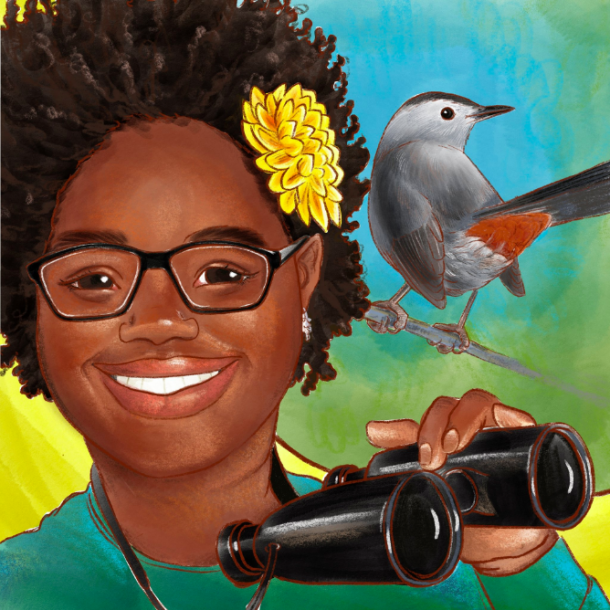
“I used to hate my dark complexion,” Jackson said. “I love birds because their features make them who they are which helps me embrace my uniqueness. My dark skin, kinky hair and full lips. Those are my features. They are part of me and they are beautiful!” Credit: Casey Girard
Q: What experiences sparked your passion for the outdoors and naturalism?
NJ: My experience wasn’t a good experience. I grew up in Cleveland, Ohio and was in foster care at a point in my life when I was really young, and I was sexually abused while in foster care. But my go to was nature and the outdoors. It was peaceful, it was calming, it was my sanctuary. It was a place I could go to and not feel sad or stressed or anxious. That isolation built my relationship with nature and it started as more therapy than anything, and then it transformed into education. I have lots of memories of going outdoors, but not the outdoors that people usually think of like national parks, or places that are far away where you go camping. I didn’t do any of that when I was growing up, it was more of our city parks playing basketball, or in our recess areas at school, and some family outings like family reunions where we would go to parks to barbecue. For me, I had no connection to spaces where there was a lot of people. I was really drawn to the isolation in nature, just because I was introverted and just needed that space and time to conserve my energy. So I enjoyed more of those moments when I was able to go off on my own while my family was doing their thing with other people and talking and dancing and the usual stuff at a family reunion. I would always go off to see if there was a lake or a river or something nearby, or trees or butterflies flying around. I would always go off on my own. At first I was attracted more to the isolation in nature, but then I learned more about the natural things in it, like watching a caterpillar crawl across a leaf or a rose blooming.
I remember there were roses growing in the front of one of my childhood homes. I noticed that a few of them were dying and I wanted to be that person to take care of the roses and make sure they get their water, sun and all that stuff. I was developing this kind of intimate relationship with nature, wanting to nurture it, but it was nurturing me at the same time. I knew it was giving me all these things that helped me deal with my childhood trauma. Because of that I want to be able to give back to nature and take care of it and learn from it, but also do that with other people. I think I was really hesitant to connect with humans and really open up to people because of what I’ve been through. Nature helped me break through that. It taught me patience, to be still. It taught me love, and how to be honest and open. It really helped me reconnect to people, and then because of all the wonderful things it gave me it made me want to teach these things to people as well. It was a full circle relationship.
Q: What impact has Black Birders Week had on you?
NJ: Black Birders Week to me was created to show people that Black people in nature exist, that we love bird watching and STEM. There’s a bunch of different layers when it comes to these types of activities, normal activities that we just want to enjoy and spend time doing them on our own, or with family, and not have to be harassed or questioned because of how we look. We wanted to create a platform featuring many Black voices so we could reach out to other people. It was also important to us to hold our white counterparts accountable for the racism and white supremacy that takes place on a day to day basis when these things are happening. When we’re going about our everyday lives there are so many things we have to be cognizant of just to stay safe.
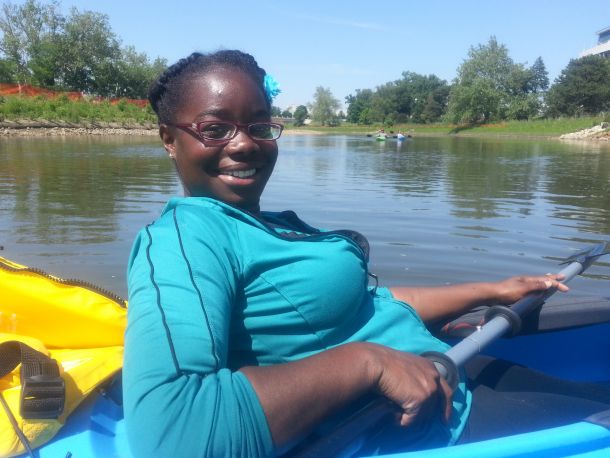
Nicole Jackson taking in the natural beauty of Ohio’s waterways via kayak.
Our presence in these spaces should be normalized. It shouldn’t just be an issue of color or race. I remember someone online commenting about me being a Black birder. I think they responded, ‘I’ll be happy when the day comes where you can just consider yourself a birder.’ For me, the focus is not on labels necessarily. I think it’s acknowledging that we exist as human beings and we’re not all the same. We’re very unique and we need to embrace those differences, but not make it a negative situation because we’re different. Celebrating the fact that you’re a birdwatcher, you’re Black, you like science, all of those things. I think that really stood out to me while going through a lot of the social media responses and posts from people of just knowing that we all have these different versions of ourselves that we’re just showing more of ourselves versus just one side. I think that should be commended, especially for Black people, because I know that can be very hard to just be vulnerable and open about those things.
I think the accessibility of birding was also a really big conversation, is it really accessible to everyone? I think having that conversation online and hearing people say, ‘I didn’t realize there was an Audubon in my neighborhood, or something close by where I can go.’ Even if there is, there’s still some hesitancy with joining a bird group or just reaching out to people who have been doing it for years, just because, you know, you don’t know if you’re going to be safe or not. Just hearing those stories and engaging was eye opening. All of the learning and the seeking of information that people wanted was just very inspiring, very uplifting. That kind of put me in a space of, I have to put myself out there because I’ve been bird watching for a good chunk of time, but it wasn’t something I made known to every single person that I knew. So I had to put myself out there and share my story, I’m a birdwatcher, this is why I enjoy it, this is what it’s doing for me. It was very difficult at first, the first day or two, and at first I felt like I don’t know if I want to do this. But then it just became more encouraging, getting support from people telling me that they support what I’m doing and that they find me very inspiring. Those things really gave me that boost of confidence to keep going and share more.
Q: In my research I found that Black Americans make up less than two percent of all visitors to National forests, wildlife refuges and parks, while white visitors comprise 95 percent of all visitors, according to the US Forest Service, National Park Service and Fish and Wildlife Service. Could you tell me more about your work on the Next Generation Advisory Council for the National Parks Conservation Association, and what your team is doing to make these public spaces more diverse?
NJ: I just wrapped up two years and I’m continuing on for another two years as a Next Generation Advisory Council member with the National Parks Conservation Association (NPCA). A friend suggested that I apply to be a fellow and I was really hesitant because of the policy aspect of it. I wasn’t very familiar with it as far as advocating for specific policies around the national parks. I ended up pushing through that anxiety and applying, and I got accepted. Through this fellowship, I was able to go visit more national parks, which I don’t think I would have been able to do otherwise. Black people and people of color still don’t feel like they have access or connection to their national parks, mainly because of how far away they are, the history around them, and cultural and educational components that need to be better. Efforts need to be amplified around groups similar to ones that I’ve interacted with who don’t feel like they have the voice to say, ‘Hey, I can change this’ That just goes back to how we want to enjoy our parks versus how we’re told to enjoy them. Which is something I’m very aware of, especially with my experiences with my family. How we enjoyed natural spaces was through barbecuing, playing basketball outside, it was music, and those things aren’t really highlighted when you’re in a national park because you know, you stay on the trail and there’s certain things that need to happen in order for it to be an enjoyable park experience where you’re not “disturbing” other people’s experiences. But different cultures are gonna experience the park in different ways and that needs to be embraced. We have a lot of knowledge and understanding of our communities and where we come from and how we want to connect to the parks.
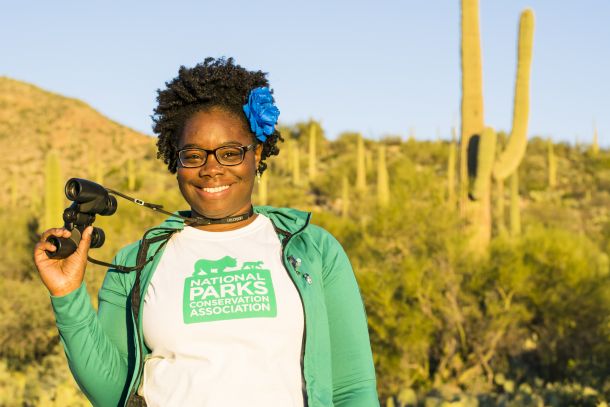
During the NPCA’s Next Generation Advisory Council retreat, Nicole Jackson was able to visit Saguaro National Park in Arizona.
Having better access is very important: education programs, the time of day programs are offered, how many people can be there, even language barriers, do we have enough interpreters? If people don’t speak English, that can be an issue with programs and representation. Also think about photos and how national parks groups are presented on websites, do we see the representation of the community within those photos? If not, do we need to take a step back and think about how that could be done better? A topic that we discussed concerning Saguaro National Park had to do with the border and communities being impacted and having access to the park. I also think access is a huge issue when I think of friends that have disabilities. There’s people who are in wheelchairs and aren’t able to access the trail because of mobility issues. I definitely think those are some areas to do better. A lot of our discussions as a group have to do with policy, education, how we’re sharing our stories and if those are being highlighted enough. If people don’t feel like they have a connection, we ask ourselves, is there a better way for us to help tell those stories? So that’s a combination of some of the conversations that we’ve had.
Q: What was your favorite national park to visit?
NJ: This past November I was able to go to Everglades National Park. During the trip our team was given a tour by a Latina mother and daughter, and hearing their stories of how they started and got into the National Park Service was very inspiring. To see them work together within the park and hear their story really warmed my heart. I had not seen very many people of color working as a park rangers or educators within the park service. There’s this certain notion if you have people of color within an organization they’re not considered essential, they’re kind of doing these demeaning jobs. But in the Everglades they were educating people about the park, they know the history and they know the different types of birds and wildlife and they connected that to their story. It was absolutely beautiful the mom had been a park ranger for decades. She still loves it just as much as when she started, not knowing the path she was going to take, and now she gets to share it with her daughter. I want to see more of that. After the tour I just thought, why can’t we just replicate this throughout the United States? In order to do that, hiring practices definitely need to change. When you apply for a position through the park service it can be a really difficult process. I think there should be more pathway programs that help people get paid internships or long-term positions within the parks. You don’t have to have a fancy degree to know parks or to understand parks. More of that historical and cultural content within the parks is definitely helpful because I feel like with that people see their place within those spaces and they feel more welcome and not isolated, they have a sense of ownership.
Q: As an environmental educator who works with urban youth, how would you like to use your skills to further the initiative?
NJ: I think it’s just continuing those conversations. A lot of them are going to be uncomfortable conversations, especially with organizations that have not set anything in place to find solutions for a lot of these problems. But more of these conversations need to happen followed by action. I definitely want to continue to teach my passion for nature and the outdoors, any chance I get. I try to do that as much as I can because we only have one life. Life long learning is definitely my motto. You don’t have to be in school to learn things. With nature, it’s always going to be there. It’s always going to be kind of like our support system. We just need to actually reach out and accept that we’re all connected and have a role to play. We’re all on this Earth together. I want to teach as many people as I can about the benefits of nature, of the awesome benefits of bird watching, and how it can help us heal and gain more knowledge of our natural world. With the momentum generated by this group, we will continue to engage with other organizations who want to learn more and do better and connect more. Also to each other, I think it’s just another opportunity to see where everyone is. I think we’re still trying to figure out as a group who we are and what we can contribute as a whole. It’s not like we came into the group with everyone knowing each other and their backgrounds and everything. We’re still figuring that out. So that just speaks to the fact that communication is just as important as the actual birding and STEM fields. Communicating what we’re passionate about and letting other people know that they can learn those things too, and they can be supportive and help amplify those voices within those fields.
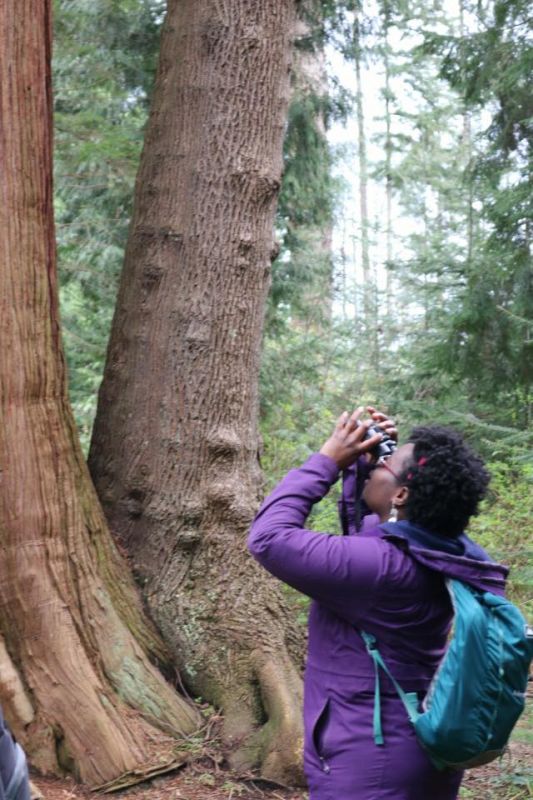
Nicole Jackson birding in Vancouver, British Columbia.
